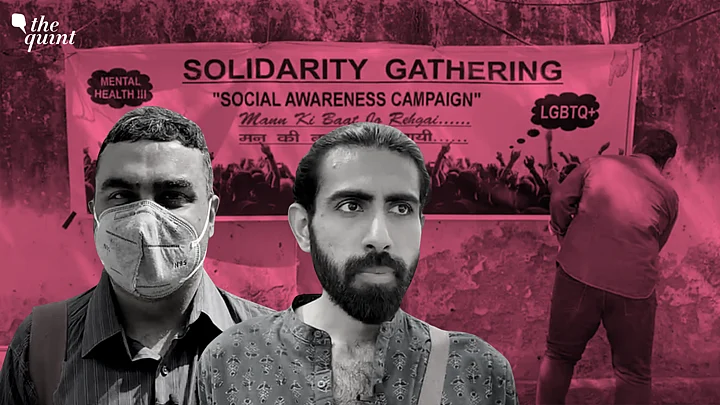(If you feel suicidal or know someone in distress, please reach out to them with kindness and call these numbers of local emergency services, helplines, and mental health NGOs.)
Over 10 days after a 16-year-old student of Delhi Public School in Greater Faridabad died by suicide after allegedly being bullied by schoolmates over his sexuality, a solidarity gathering was organised at Delhi's Jantar Mantar by the deceased's family members.
The thinly-attended gathering started at noon, and one of the people present was 24-year-old Yash who works as a management consultant. A stranger to the teenaged boy, Yash said that the child's struggles reminded him of his own time in school.
"He used to stay less than a kilometre from my home, so was the school. I have grown up in Faridabad in similar schools that do not have a safe environment for gender queer kids and women" Yash said.
"I have gone through all what this kid went through in terms of bullying. So when I heard the news, it hit home," he added.
The 16-year-old student had left behind a suicide note, which was recovered from his residence by the police on 24 February. In that, he wrote:
"Dear Mumma, you are the best mom on this planet. I am really sorry that I could not be braver. This school has killed me, specially higher authorities."
The teenager's mother has stated in the police complaint, “I had filed several complaints to the school authorities but no action was taken by them. My son was depressed and his treatment was going on from Delhi."
An FIR has been registered under section 306 (abetment of suicide) of the Indian Penal Code (IPC) against the headmistress, who is the academic head of the school. She was later arrested.
'The Fear You Feel in Your Bones Is Real'
Among those present at the gathering was poet Akhil Katyal. He told The Quint that the letter brought back terrible memories from his own time at school.
He said, "It brought back memories from school. I was studying during the 90s, which is a long time back. There was no one to talk to. The fear you feel in your bones is real – whether it was teachers, classmates, parents, or family. There was no one to have a meaningful conversation with. Sometimes even the distance between the school gate and the assembly ground felt like the longest distance.”
Katyal adds, "The school as an institution has to make it a point that this conversation (around sexuality and mental health) has to be consciously brought to the table. If you think the conversation only does not happen, you are wrong. The conversation is happening through popular culture. Sexuality has always been at the centre of the table. However, it’s either a butt of jokes or it’s a subject of violence or bullying. In order to bring an antidote to that there have to be supportive, progressive, important converasations."
The gathering, barely attended by 50 people, also had several speakers sharing their experiences of struggle. A group of students from different colleges also performed a play to explore the intricacies of bullying and how one may stand up against it.
Meanwhile, a group called the Social Union, which strives for an inclusive community and works on issues around gender, social, and sexual inclusivitiy for Gen-Z and millennials was also present.
Member Aadhya Sarna, 21, told The Quint, "We want a wholesome, inclusive curriculum. We want sensitisation programmes, not just for children, but also for teachers, as they can be very insensitive."
Sarna added, "We want to include sensitisation curriculums on sex-education, gender rights, queer people, and dyslexia."
We also spoke to Aakash K Agarwal, a jewellery designer by profession and a member of the Deepa Ardnareshwar Empowerment Foundation that has been working for gender sensitisation in government schools and offices for the past five years.
"We are not just here to show our solidarity but also to express our discomfort. Schools play a major role in shaping us. At the end of the day, parents leave it all to the schools. But the school only looks forward to give us meritorial education and not for a child who is growing up all together," Agarwal said.
Meanwhile, the boy’s cousin, who studies law and was coordinating the gathering, told The Quint that even when kids do share their feelings of anxiety or depression with their parents, their parents infantilise and ignore them.
She adds, “We need to accept that mental health issues are valid and we need to be able to acknowledge them.”
(At The Quint, we question everything. Play an active role in shaping our journalism by becoming a member today.)
